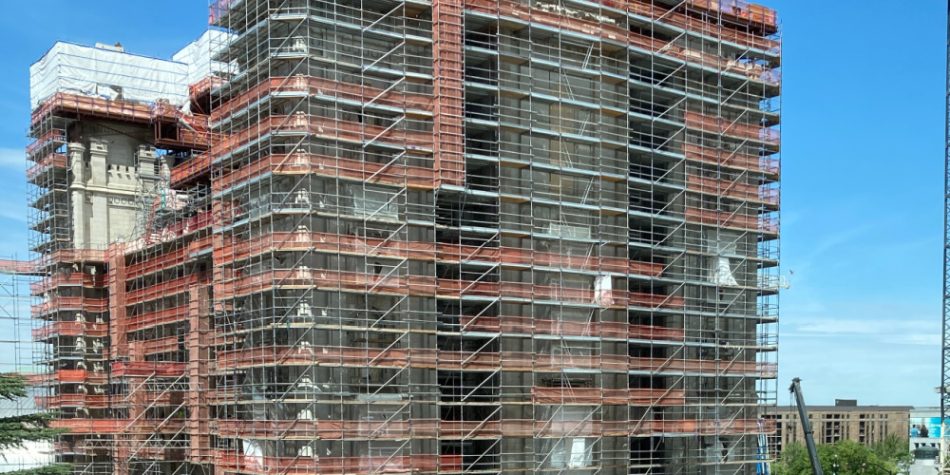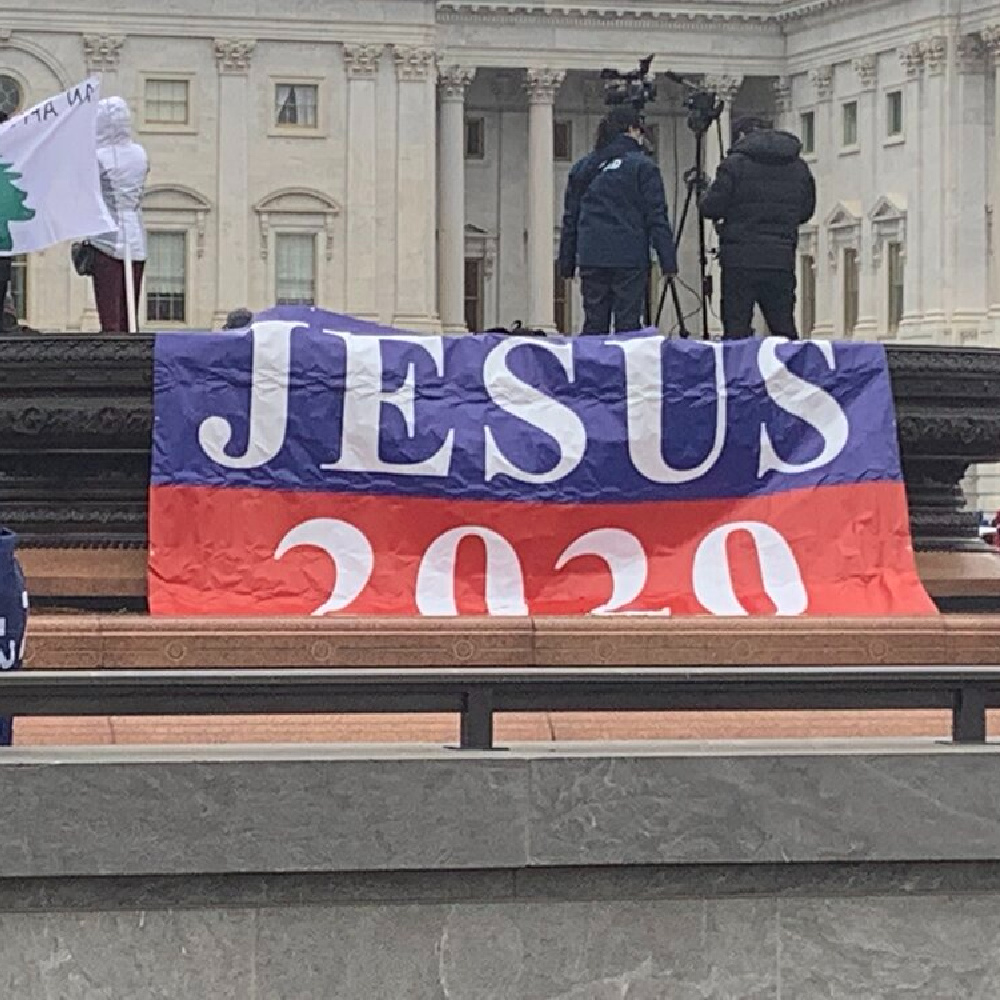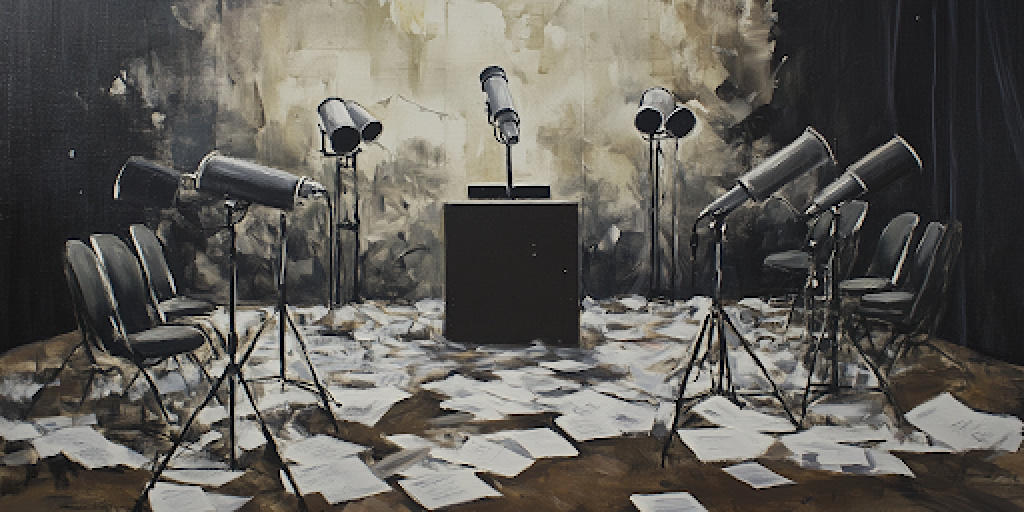As I return to my office space on Temple Square for the first time in the post-COVID world, my west-facing window shows me a scene of 21st-century desolation.
It is March 2022, two years into a half-decade seismic renovation of the Salt Lake Temple. The familiar ground surrounding this iconic house of the Lord is gone. No more flowers and trees, walkways and benches, grass and statues. In their place are cranes, scaffolding, dump trucks, backhoes, debris, Porta Potties, and construction workers moving about like ants in white hard hats and fluorescent yellow vests. Some parts of the grounds are being excavated nearly 70 feet deep in a spirit of total overhaul. 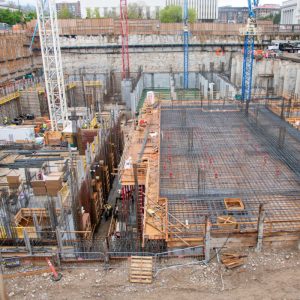
All of this, along with the incessant beeping of construction vehicles and the mind-numbing rumble of jackhammers, reminds me that an old world is ending and a new one emerging.

Jesus said there are times when even the stones can speak (see Luke 19:40). What I see through my window cries out like a preacher from a pulpit of rock and rebar: 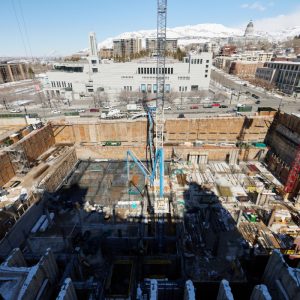
Cherish the ground you walk on!
Honor the influences that uphold you!
So much that makes life wonderful can be as hard to notice as the ground beneath our feet. Strong marriages. Loving families. Deep friendships. Beloved traditions. Civil society. They’re always there—until they’re not. And we suddenly find ourselves in change’s Gordian knot, our souls wrapped mummy-like in scaffolding, as is the Salt Lake Temple.
Growth, Not Comfort
God is a dramaturge, the best of writers, concerned with even the smallest of detail in this earthly thriller we call life. But His writing isn’t merely for dramatic effect.
It’s for our eternal growth. All of this reminds me that an old world is ending, a new one emerging.
But in storms, sandbags are moved for a purpose. God, I learned, cares more about my growth than my comfort. I see now that those frequent moves put me in places and situations where I could do the most good and that were best for my soul.
I think also of my mother-in-law, Ginger DeLaMare Cannon. From the time I was engaged to marry my wife in 2006 until Ginger’s death from cancer in 2019, frequent visits to grandma’s house in Logan were a reliable part of our routine. With her death, the solid ground of that tradition became shaky, soggy, and strange. A cherished mother and grandmother was gone. Her house was sold. Most visits to Logan ceased.
We moved on.
Those 13 years are frozen in photographs, in videos, in hearts.
And then I think of a colleague who, one year later, retired. His illumined lamp light above his cubicle was, for the 10 years we worked together, a sure sign that he was in the office. That light was a metaphor for his presence. His power did not come from a high position (he was one of the hoi polloi). Every day he infused the office with spiritual leaven through compliments and humor. Every day he inspired us through his willingness to do things others didn’t want to do.
I did not know how much I would miss his jolly presence.
And then he was gone, leaving me with 10 years of time that I can visit only in the musty halls of memory.
A week after my friend’s retirement, COVID-19 hit, dissolving the ground of office work that so many had stood on for decades. In Utah, as if our Heavenly Parents were turning up the volume on a key message, we awoke to a 5.7 magnitude earthquake just three days into lockdown. That morning, our girls ran scared into our room, and our neighbors rushed to grocery stores in panic. The words of scripture came alive: “For not many days hence and the earth shall tremble and reel to and fro as a drunken man. … And all things shall be in commotion; and surely, men’s hearts shall fail them; for fear shall come upon all people.”
Fortunately, COVID was a mixed blessing of pain and pleasure, a bit like Socrates’ two-bodied animal of old. “If [a person] pursues and catches the one, he is almost always bound to catch the other also, like two creatures with one head,” that ancient teacher says in Plato’s Phaedo. I warmly welcomed the new rhythms of working from home like long-absent family. I began to see my wife and daughters so much more. This was and continues to be a miracle as great and unexpected for me as the parting of the Red Sea was for the Children of Israel.
My return to work in March 2022 brings the opposite feeling. I’m consumed with an empty melancholy. The old familiar office space is gone, replaced by a new floor design, new colors, new cubicles, and chairs. What were once simple and quiet walks around Temple Square are complex and noisy affairs because of construction. The people I ate lunch with aren’t here; different teams come in on different days.
Working in the office can be lonely. I’m left to walk down a hall of memories sealed behind glass.
‘Ye Shall Not Surely Die’
Losing familiar ground is just one of the many ways we taste death. One of the devil’s first lies to the first people on earth was that they would never die. To never die is to always walk on solid ground, to never change, to never need to adapt.
Indeed, many today live as though death doesn’t exist. We don’t like to think about it. We’d rather not talk about it. We hide it from view like dirty laundry. We cover it up like body odor. We are shocked when it happens.
Yes, death is sad, a goodbye nobody wants to say.
And yes, we mourn when those we love die (we are, in fact, commanded to do so).
But we are wise to live with eyes wide open to the reality that everything—absolutely everything—dies. And that expiration can come anytime, anywhere.
The Book of Mormon and the King James Version of the Old Testament use an insightful phrase to describe death. When someone is about to die, they say they are going “the way of all the earth.” Everything on this planet—food, relationships, youth, health, people—expires. How should we interpret this depressing reality? Speaking in 2015 to Latter-day Saints in Moscow, then-Elder Russell M. Nelson provided a helpful frame. “God gave us a special gift,” he said. “It’s called the aging process—just to remind you that you’re temporarily here on planet Earth, because you’re one of His children, and He wants you to come home.”
As I creep toward 40, every day a little closer to that heavenly home, I see that my accumulating life experience yields a painful wisdom that is “more profitable than silver” and has “better returns than gold” (Proverbs 3:14, NIV). Insufferable people and social situations become less so when you grasp how brief are the various phases of life.
So many hellos.
So many goodbyes.
I’m inclined to try a little harder, show a little more patience, and enjoy a little more of the moment.
As I did prior to the pandemic, I continue to wander around the Joseph Smith Memorial Building when my mind needs to stretch its legs. This building, a house to the ghosts of a century of memories, is a fitting place to mourn a dead past. The surrounding construction has reduced foot traffic considerably. It’s quieter now. My wanderings yield such poems:
Change makes me feel
naked as a branch in winter,
my pointy edges so real,
the soul ready to splinter.
Everything we behold
has a birth
has a life
has a death—
it all runs out of breath.
Childhood and teen years,
married life and careers.
We’re always changing gears,
moving to new spheres.
I’m as impatient as Enoch:
When will the earth rest
and in quiet nest the blessed?
That impossible time when
everything we behold
never grows old,
has infinite breath,
and no sign of death.
Count on it: The intensity of change of the past few years is but a drip of the oceans of upheaval yet ahead. That’s not such a scary thought when you see life as a school of experiences custom-designed for your eternal growth. The intensity of change of the past few years is but a drip of the oceans of upheaval yet ahead.
Until our world rests in millennial peace, the only reliable ground you and I will ever find is the Rock that is the life and teachings of Jesus Christ. But we ought also to count on this: Because God cares more about our growth than our comfort, even that solid stone is likely to sometimes feel like grumbling ground as we pass through difficult days.
And that’s okay. Because, as Elder David A. Bednar once said, “everything about the gospel of Christ is about not staying the same. You can’t insist on doing things the way you’ve always done them and expect to progress.”
So, in the words of President Nelson, “eat your vitamin pills, get your rest,” and prepare to grow some more.

